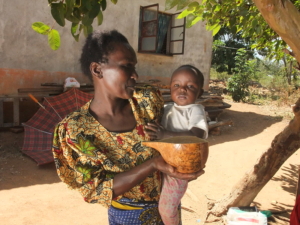Saving Lives: Tackling Maternal Mortality in sub-Saharan Africa
 Maternal mortality remains one of the most pressing public health challenges in sub-Saharan Africa. In regions like Liberia, Sierra Leone and other underserved areas, the lack of resources, trained professionals and access to essential medications means that around 300,000 women die each year from preventable complications of pregnancy.
Maternal mortality remains one of the most pressing public health challenges in sub-Saharan Africa. In regions like Liberia, Sierra Leone and other underserved areas, the lack of resources, trained professionals and access to essential medications means that around 300,000 women die each year from preventable complications of pregnancy.
Life for African Mothers (LFAM), a U.K.-based charity founded 19 years ago, is at the forefront of tackling this crisis. LFAM operates in some of the world’s most impoverished regions, dedicating its resources to saving mothers’ lives by providing vital medications and training health care workers to improve maternal health outcomes. Entirely volunteer-driven, LFAM’s efforts have become a beacon of hope for thousands of women across sub-Saharan Africa.
The Urgency of Maternal Mortality in sub-Saharan Africa
More than 80% of maternal deaths are preventable, particularly those from postpartum hemorrhage (PPH). The number, 300,000, has remained stubbornly high for more than a decade. Despite the affordability of medication, logistical costs and the high number of mothers in need pose significant challenges. Many clinics in rural and underserved regions lack consistent access to misoprostol, significantly increasing the risk of fatal complications during childbirth. This is where LFAM’s intervention becomes crucial.
The LFAM Project: Two-Pronged Approach
The primary goal of LFAM is to reduce maternal mortality in sub-Saharan Africa, particularly in countries like Liberia and Sierra Leone. LFAM’s project is built on two key pillars:
- Distribution of vital medication: Since its inception, LFAM has been working to procure and distribute misoprostol to hundreds of health facilities across Liberia, Sierra Leone and other sub-Saharan African countries. By ensuring that each clinic has a consistent supply of this life-saving medication, LFAM addresses one of the biggest barriers to reducing maternal mortality.
- Training health care workers: In addition to providing medication, LFAM prioritizes the training of health care workers. This training focuses on the proper administration of misoprostol and Emergency Obstetric Care (EMOC). Through partnerships with local midwives and hospitals, LFAM introduces practices in maternal care that can have a lasting impact on the health system. The goal is not only to provide immediate relief but also to foster self-sufficiency in these clinics, enabling long-term improvements in maternal health care.
LFAM’s project implementation involves a comprehensive and continuous process of reviewing the existing needs of each clinic, supplying misoprostol in bulk and delivering these supplies to hundreds of clinics across the region. Regular monitoring of maternal health outcomes ensures that the program can be adjusted to maximize its impact and expand where necessary. This systematic approach helps LFAM address both the immediate and long-term needs of maternal health facilities across the region.
Saving Lives
LFAM has shipped more than 5 million tablets of misoprostol to sub-Saharan Africa, potentially saving around one million lives. The organization has also educated 1,000 midwives, highlighting its dedication to tackling maternal mortality in sub-Saharan Africa. The primary beneficiaries of LFAM’s work are women in rural and underserved areas of sub-Saharan Africa, where access to emergency maternal care is limited or nonexistent.
These women, especially those at risk of life-threatening complications, are often miles from the nearest health care facility. LFAM aims to reach approximately 10,000 mothers annually by working with local clinics to ensure that even the most remote areas receive the necessary supplies and support. This strategy addresses the geographic and socioeconomic disparities that make maternal health care inaccessible for so many women in the region.
Saving mothers’ lives enriches communities and encourages prosperity in the most impoverished countries. Poverty and maternal death rates are inextricably linked. When a mother survives childbirth, she can care for her newborn and contribute to the social and economic fabric of her community. LFAM’s work is helping ensure that more women survive to fulfill this role.
Lasting Solutions
LFAM’s model is designed with sustainability in mind. By investing in training local health care professionals and partnering with governments, the organization is helping to create a system that can continue to function even after LFAM’s direct involvement ends. This long-term approach ensures that the improvements in maternal health care are not temporary but instead form the foundation for a healthier future.
LFAM’s mission is clear: to prevent unnecessary maternal deaths in sub-Saharan Africa. However, this work is only possible with the continued support of donors and partners. Every pound invested in LFAM’s projects helps save lives, empower communities and improve health care systems in some of the world’s most underserved regions. With donor support, LFAM continues to contribute to a brighter and healthier future for thousands of mothers and their families, forging a path toward a world where no mother dies from preventable causes during childbirth.
– Staff Reports
Photo: Flickr
